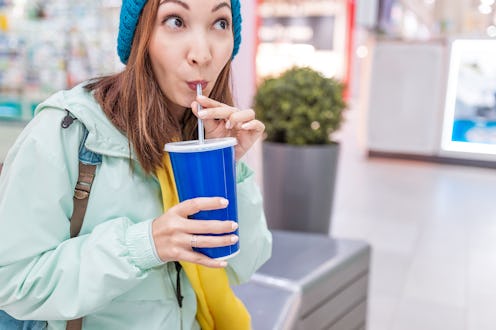
So many moments in life seem to call for soda. It pairs well with movie theater popcorn, is the drink of choice on long road trips, and all but materializes along with a plate of fries in restaurants. It's also a lunch staple, for many folks, and a go-to beverage at dinner. And all of that can make it tricky to cut out soda from your everyday diet.
Lots of changes occur in the body once you make the switch to something less sugary — like water or tea — and it can be uncomfortable at first. "When your brain doesn't get the sweet taste in foods or drinks, it will initially miss this," Dr. Mike Dow, a psychotherapist, nutrition expert, and author of Sugar Brain Fix, tells Bustle. "Additionally, your brain was also getting both serotonin and dopamine from the sugar and caffeine, respectively. So, you'll be irritable and get headaches and really be craving that soda."
But this can also have a lot do to with the associations you've created with soda. You may crave the carbonation, Lisa Richards, a certified nutritionist, tells Bustle, "especially at meal times, because of the psychological connection between the two." Drinking flat water might not feel right, if you're used to a bubbly beverage.
The good news is these cravings will pass. Once soda has a constant presence, the tastebuds recalibrate to prefer super sweet foods, Dow says. But research shows you can change them back, and that it'll take about a month. You will adjust, your brain will stop screaming out for sugar, and you'll eventually be perfectly OK with a glass of water.
And once you do stop drinking soda, other positive changes will start to happen. "You'll feel more calm," Dow says. "Even one soda at 3 p.m. can negatively affect your sleep. But it's not just sleep... it's anxiety and a sense of peace. It's stepping off the roller coaster of highs and lows."
Soda messes with your blood sugar, leaving you feeling spiked one moment and crashed the next. "Simple sugars (like those in soda) are absorbed into the bloodstream very quickly, which can give you a rush of energy," Erica Ingraham, MS, RDN, a registered dietician nutritionist, tells Bustle. "In large doses it may feel similar to anxiety or panic. That's because in fight-or-flight mode, blood sugar levels increase naturally to provide muscles and the heart with extra energy in case you need to make a run for it. If you have a lot of sugar in the bloodstream, it can mimic this stress response, which can lead to elevated blood pressure and heart rate and trigger anxiety."
Once sugary beverages are off the table, you might notice your digestive system starts working better, too. "You'll poop better [...] and won't feel so bloated," Dow says. "Peristalsis (the wavelike contractions that move food through you) and the whole digestive process do better with water and whole foods with fiber."
Even with all these positives, though, it can still be difficult to cut back on soda. So go ahead and try a few things to make the transition easier. "The first thing you want to do is to get in front of the hydration," Dow says. "Carry a big jug or water (lemon, mint, berries are optional). Don't let yourself get thirsty. When you get thirsty, you'll feel really tempted to reach for soda."
And if you're looking for a way to get through the day, and have noticed that soda has become a main source of energy, find a different way to get caffeine. "Unsweetened iced tea with lemon, coffee with organic cream, matcha green tea," Dow says. "This will prevent the headaches and withdrawal from the caffeine."
From there, think about what else your diet may be missing, and how it might be contributing to your need for soda. "You may be craving the soda because your body is not getting the calories it needs through food," Ingraham says. "Soda offers your brain and body a quick form of energy that is easy to break down and use immediately. If you have a tight deadline and need to focus intensely, you may crave soda to power you through. But if you are eating consistent meals and snacks, your cravings will likely decrease."
Stockpiling other fizzy drinks won't hurt, either. "If you find yourself craving the carbonation of a soda, choose a [...] sparkling beverage like sparkling water or flavored sparkling water," Amanda A. Kostro Miller, RD, LDN, a registered dietician who serves on the advisory board for Smart Healthy Living, tells Bustle. If it's more the bubbles you miss than the sugar or caffeine, this'll help you adjust.
Fizzy drinks can be a good choice, too, if you're someone who "hates" the taste of water, Kostro says. Sugar-free sparkling water with a splash of fruit juice can be a great replacement, she says, as you ride out the cravings. Keep these options on hand and sip away whenever you want to reach for a soda, and it'll be much easier to stick to your plan — and hopefully notice a few positive changes in how you feel.
Study Referenced:
Wise, P. M., Nattress, L., Flammer, L. J., Beauchamp, G.K. (2015). Reduced dietary intake of simple sugars alters perceived sweet taste intensity but not perceived pleasantness. The American Journal of Clinical Nutrition. 103(1) 50-60. https://doi.org/10.3945/ajcn.115.112300
Experts:
Dr. Mike Dow, psychotherapist, nutrition expert, and author of Sugar Brain Fix
Lisa Richards, certified nutritionist
Erica Ingraham, MS, RDN, registered dietician nutritionist
Amanda A. Kostro Miller, RD, LDN, registered dietician who serves on the advisory board for Smart Healthy Living